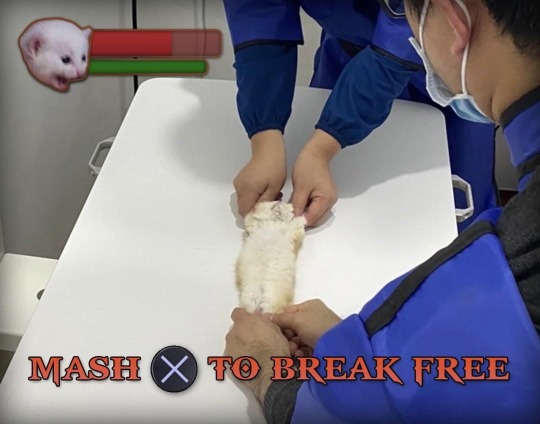Text
𝐍𝐀𝐑𝐅𝐈 & 𝐕𝐀𝐋𝐈 , 𝐒𝐎𝐍𝐒 𝐎𝐅 𝐋𝐎𝐊𝐈
It’s clear that Hel will one day appear in future releases, as hinted in both GOW(2018) and GOWR, but anyone who is a myth enthusiast knows that Loki had other children besides his monstrous offspring in Norse Mythology because interestingly enough, GOW’s wiki community decided to include "Narfi & Váli" despite no evidence of their existence whatsoever throughout the Norse era.

Of course, it’s also a fandom site; while they can be a reliable source, said sources on their encyclopedia are sometimes inaccurate. Knowing the impossibility of their existence, I also thought about how they can coexist throughout GOW.
EDIT UPDATE 2/1/2024: Recently, the GOW's wiki community updated Atreus' "uncertain future" category and the links to Váli's & Narfi's wiki pages no longer existed. Doesn't mean it'll stop me from enjoying my fun. 😎🔥💯
EDIT UPDATE 7/22/2024: Nevermind, they're mentioned on Angrboða's wiki page for some reason…Váli & Narfi aren't the same as Fenrir & Jörmungandr ☝️🤓 but okay. ☠
And the more I thought about it, the more apparent it became that they’re essential for the franchise…but it’s more like my personal headcanon rather than my “crack” theory so might as well call this an AU for shits and giggles. I thought it would be fun to share my overly long detailed analysis with those who are fixated on Atreus’ other (im)possible children as much as I am because I need this to get it out of my system since they have been living rent-free in my head for almost a year just now. This blog is now officially a Narfi & Váli stan account and Kratos would have LOVED his grandsons if they ever appeared in GOW, but it's very unlikely that would happen. This analyis is going to be a long one so bear with me!
I think it would be poetic for GOW to end off including Narfi & Váli (alongside Atreus) for the final conclusion of the franchise; and yes, Hel would be an adult in this timeskip, contrary to popular belief that they were children in Norse Mythology. Despite their unfortunate demise, their backgrounds are nothing like their half-siblings’ in the Norse Mythos, making them the most ordinary of all Loki’s children. But you know what? The concept of Narfi & Váli being the epitome of normality of all Loki’s offspring gave me an a idea...I’m not sure if anyone has noticed, but Narfi & Váli exhibit some similarities to Kratos & Deimos.
Before the Olympians (Athena & Ares) pursued one of the brothers due to a doomsday prophecy, Kratos & Deimos believed they were mere mortals during childhood as they still fit the epitome of normality as children, similarly to Narfi & Váli. They’re also gods at birth, but the only difference is that Narfi & Váli most likely knew about their divine nature, whereas Kratos (excluding Deimos) only discovered it later in adulthood (a silly parallel, but I still think it counts).
Another example would be in the parallel dynamics of Váli & Kratos, as they both had experiences where they succumbed to their primal instincts in different circumstances; Váli unwillingly turned into a wolf and killed his brother driven by primal instincts under the Æsir’s (or presumably Odin’s) influence, almost similar to how Kratos was deceived and unaware, killed his first wife and daughter fueled by his primal desire for blood under Ares’ influence. While Váli’s fate remains unknown after Loki's Punishment, we can infer that both Váli & Kratos are the only survivors other than their brother.
While the deaths of Narfi & Deimos are an obvious parallel, they're also linked to Bounds and Punishment in distinct ways; like Váli, Narfi was punished with his entrails used as bounds in retribution against his father, as well as due to his relation with Loki while Deimos, on the other hand, was bound and punished due to his existence as the "Marked Warrior" (same thing goes with Kratos since he too was also bound and punished at one point in Ascension).
On top of that, they were also subjected to violence as children inflicted by Gods. Consequently, it ultimately led the downfall of both Æsir & Olympians, as predicted by their prophecy. The prophecy of the "Marked Warrior" bringing destruction upon Olympus began the moment they abducted Deimos. The sufferings of Kratos' family (including Sparta and Pandora) at the hands of Gods contributes the downfall of Olympus. Their tragedies are the major cause of Kratos' justified vengeance to destroy the entire pantheon, ultimately leading the devastation of the Greek world.
In Norse Mythology (with my limited knowledge); the Æsir's (mostly Odin's) retaliation on Loki's monstrous children, particularly Fenrir, due to prophecies contributes their downfall in Ragnarök, especially with their involvement in Loki's Punishment. However, I believe that the suffering of Narfi & Váli at the hands of Æsir Gods is the primary cause for Loki's justified desire for vengeance. The Æsir's use of Narfi's entrails, his own son, as restraints adds insult to injury, intensifying Loki's anger. Obviously, Loki joined forces with those against Æsir Gods with his army of Hel's people while the events of Ragnarök lead the devastation throughout the lands.
But since this is GOW, I found this YouTube comment (which I've kept for quite some time) that perfectly said my thoughts out loud:
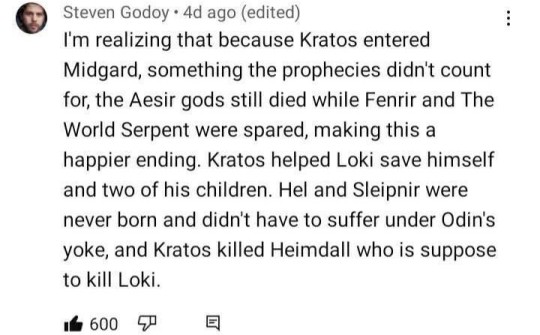
With the absence of Loki's Punishment; not only Kratos saved Narfi & Váli from Æsir's (particularly Odin's) wrath, he also prevented a similar tragedy that would inflict upon his grandsons the same way that Gods once inflicted upon him and Deimos as children, in which, fits the overall theme of subverting prophecies in GOWR.
𝐍𝐀𝐌𝐄 𝐒𝐔𝐆𝐆𝐄𝐒𝐓𝐈𝐎𝐍
Santa Monica could have easily had Atreus name his sons "Narfi & Váli" as everyone expected from Norse Mythology. But given Santa Monica's innovative approach to myth characters through creative liberties, using "Narfi & Váli" wouldn't work within the narrative structure of GOW's distinct retelling of Folklore, especially the Prose Edda of all settings.
From what I've heard, there has been a debate about whether "Váli" is a son of Odin or Loki, or both Valis existed as sperate characters. Additionally, in GOWR, there's already a boss character named Vali (The Oath Guard), which I assumed (correct me if I'm wrong) it's a cultural practice for parents to name their child after a Norse figure in Scandinavian countries, but I find it unlikely for Atreus to name one of his children after an Æsir or any God in general. Similarly, Narfi shares a name with another Giant unrelated to Loki whatsoever...but given the wide variety of Gods and other myth characters we've seen from Greek Mythology depicted in GOW, it wouldn't be surprising if other Narfi, and particularly, Váli Odinson were to mentioned or featured in future releases.
If you're not aware or need a reminder, Atreus gets to learn about Deimos during "Animal Instincts" side quest. Whether you choose to bring Atreus or Freya doesn't matter, it doesn't change the fact that Santa Monica had intended for Atreus to know about his uncle, it's still canon either way.
Atreus' identity has roots that go beyond his Norse counterpart (both symbolically and narrative wise along with the origins of his Greek name) and very likely that Santa Monica would take a similar approach with "Hel" in future releases (I've seen people suggest her name could be Faye/Laufey or Calliope, or even Callisto or Angrboða's mother). It's only fair that "Narfi & Váli" should get the same treatment…so imagine how moving it would be if Atreus were to name his sons after Kratos & Deimos.
"Váli" 𝐊𝐑𝐀𝐓𝐎𝐒 𝐈𝐈, named after his grandfather, transformed from a monster into a benevolent God due to his ability to change and open his heart, representing the beacon of hope...and "Narfi" 𝐃𝐄𝐈𝐌𝐎𝐒 𝐈𝐈, named after his great uncle, whom Atreus had known but never met (but wishes they had), honored his uncle by naming his youngest son after him.
EDIT UPDATE 3/7/2024: Just recently discovered in Greek Culture, it's common for children to be named after their grandparents, in which, aligns with my case for "Váli" to be named after his grandfather! While "Narfi" is named after his great-uncle, I believe (correct me if I'm wrong) the naming tradition also involves material/paternal relatives, which is fitting within the context of GOW. ^^
There are hearsay, or statements from Cory Barlog, that Kratos couldn't bring himself to name his son after his brother due to past memories…Atreus, on the other hand, seems open to the idea of naming one of his own children after his uncle he never met.
𝐍𝐀𝐑𝐅𝐈 & 𝐍𝐀𝐑𝐈/𝐓𝐇𝐄 𝐌𝐈𝐒𝐓𝐑𝐀𝐍𝐒𝐋𝐀𝐓𝐈𝐎𝐍
Besides Narfi Lokison and other Narfi, their accounts become somewhat unclear when Narfi's brother is addressed as "Nari." This time, it's Narfi who turns into a wolf and kills Nari. However, some sources later changed Narfi's name to Váli, both in historical texts and modern media...
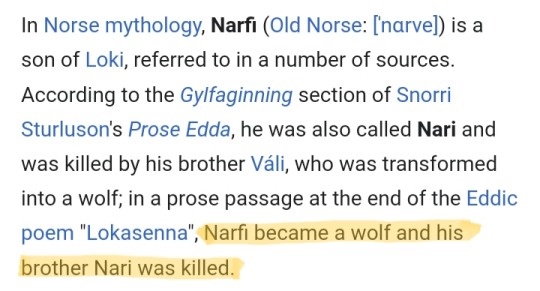

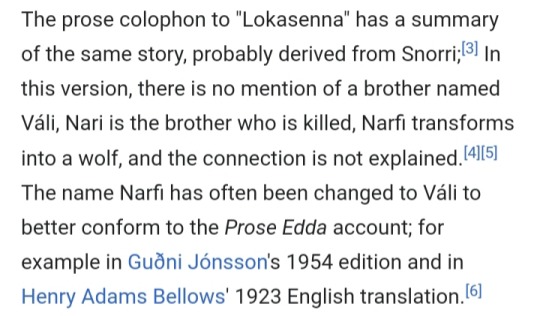
EDIT UPDATE 7/21/2024: Initially, I thought this version was made based on the notion that Váli was Odin's son rather than Loki's. But after some further investigation, I'm inclined to believe that Váli is a singular character while Narfi & Nari are Loki's sons. It's also possible that "Narfi/Nari" is referred as the same character, as the belief that Váli is Loki's son is a common mistake in today's media. It would have been so easy to overlook the mistranslation and go along with the usual understanding of "Narfi & Váli"…but thinking about it now, this could actually work within the narrative structure as prophecies are ambiguously depicted in GOWR.
How about this: "Váli & Narfi" (or "Narfi & Nari") can shapeshift into wolves. Not only it emphasizes their connection with Atreus/Loki, but as a reflection of Kratos & Deimos through Speki & Svanna.
EDIT UPDATE 7/26/2024: This might be a overreach...but if Kratos' presumption that Speki & Svanna were boys did reflect something, then it could be described as a projection of his experiences as a military general as well as an extension of subconscious affection. For Kratos' case, people form stronger bonds with animals than with human (and Gods) since often times they can be deceitful/malicious, conceited, narrow-minded, backstabbing, or calculatively manipulative through obligations/false promises while animals (wolves) would instead be much more pragmatic about survival and tender care.
Speki & Svanna (+Fenrir) have been usefully vigilant and reliable wolves that aid him and Atreus, and given the history of humans surviving in collaboration with animals, there is precedence for Kratos subconsciously associating the wolves with memories of Spartan warriors he had by his side almost as though they were his own family, where survival relied on the coordination of his armies and the care given to ensuring that his men were left standing after battle.
This can very easily be associated in the mind as symbolic of a dedicated and responsible soldier as a result from a pivotally formative part of his life revolved around the Sparta's military…and out of remorse (for the casualties of people under his care amidst the war he's wrought) and love (for those who've either perished or lived as well as the people who stood by him), it felt plausible that he could've associated this with Speki & Svanna (shout out to my irl friend for cooking this up!).
Regardless, I can also imagine this as a foreshadow of Kratos' doting relationship with his future grandsons!
𝐅𝐈𝐍𝐀𝐋 𝐂𝐎𝐍𝐂𝐋𝐔𝐒𝐈𝐎𝐍
EDIT UPDATE 7/21/2024: As much as I adore the relationship between Kratos and his grandsons, I personally think it would be better if they never met in person (rest assured, Hel is fortunate enough to know their grandfather as a child). As I mentioned before, Narfi & Váli should appear by the end of the franchise, and what better way to conclude Kratos' journey than being remembered as the benevolent God even after his death?
Kratos once quoted, "Death can have me, when it earns me" might foreshadow his potential death for the final installment. Given that Kratos had "died" in previous games and even evaded his predicted "death" in GOWR, I think it would be flitting to conclude his journey if the franchise comes to an end (in which, would have opted Atreus to name one of his sons after their grandfather). But it's just a personal theory of mine, so I digress.
Narfi & Váli serves as character foils for Kratos & Deimos, illustrating their childhood origins from Ghost of Sparta to the narrative's conclusion with Narfi & Váli emerging at the end. With wisdom gained from experiences and mistakes, Atreus, aged with greying hair, gazes at his sons and feels as if his father and uncle are reunited once again…relieving their childhood they never had as children.
If you made it this far, then congratulations! Here's a quick (and old) sketch of my variant of Váli would look like:
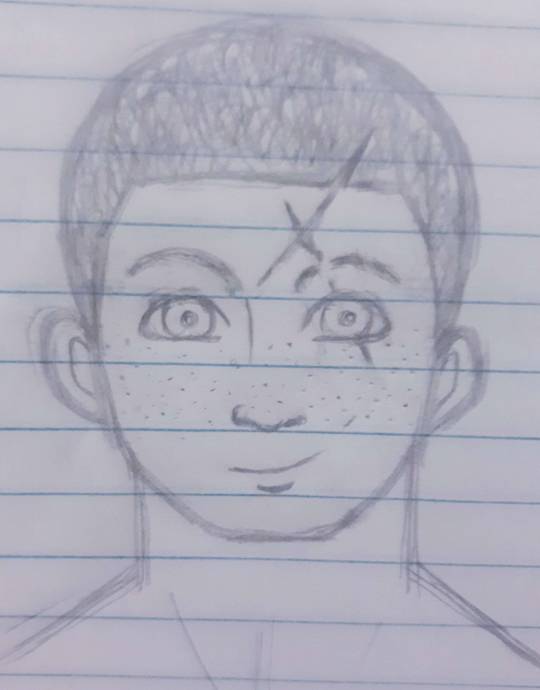

EDIT UPDATE 12/19/2024: Tried my best to replicate his facial structure. He's basically Kratos 2.0 with a decent childhood who smiles a lot more than his grandfather ever did in Sparta (he also has his grandfather's eyes and freckles from his father). Narfi, on the other hand, looks a lot more like his father with the iconic mark as a homage. They're basically Yuki & Ame (+Atreus w/Hana) from Wolf Children (I never watch the movie, but it's the vibes I'm get from them)! ^^
76 notes
·
View notes
Text
I printed a cat wheel for them and Leo is more interested in mugging for the camera than exercising.
Valid, buddy.
3K notes
·
View notes
Text
linus takes a trip to the nether. birthday gift to my sister
85K notes
·
View notes
Video
when you tryna chill but your siblings love annoyin you
825K notes
·
View notes
Text
i thought my boyfriend had fallen or died but no it was. the
6K notes
·
View notes
Text
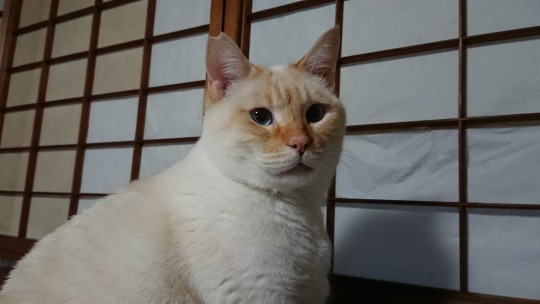
家主は…オレがしょうじにシワをつけたと?
Hey landlady, do you say I crinkled this paper slide door?

むー……
Hmmmm……
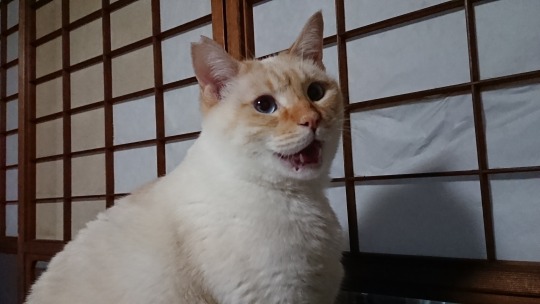
そうですよ!オレですよ!オレがやりましたよ!
That’s true! I did! I crinkled this!
125K notes
·
View notes
Text

Midi considering how she feels about this representation
12K notes
·
View notes

